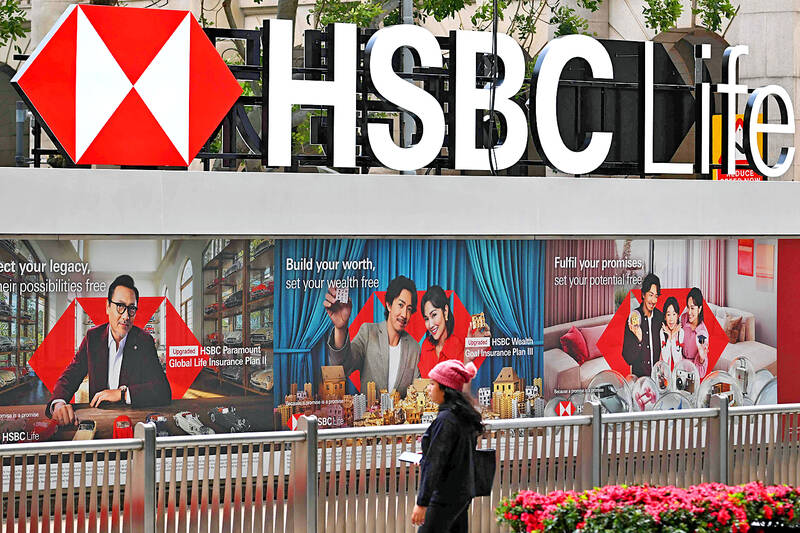HSBC Holdings PLC pushed back its deadline to meet a number of key climate targets by two decades and is reviewing other objectives, as Europe’s biggest bank yesterday said its efforts to cut emissions are being hampered by the slow pace of decarbonization in the wider economy.
“We are now focused on achieving net zero in our operations, travel and supply chain by 2050,” HSBC said in a report alongside its fourth-quarter earnings. “Progress in reducing emissions in the Scope 3 supply chain component is proving slower than we anticipated.”
It is the latest retreat from climate goals that a number of financial behemoths say are becoming increasingly unrealistic to meet.

Photo: AFP
They say that cutting financed emissions in line with a scenario in which the average global temperature rise is limited to 1.5°C above preindustrial levels is not feasible in a world on track for roughly twice that level of warming.
HSBC now expects to cut Scope 1 and Scope 2 emissions — pollution produced directly, or through the generation of power consumed — by more than 90 percent from a 2019 baseline by the end of the decade. It forecast a smaller reduction in Scope 3, emissions tied to suppliers and customers.
The bank expects to curb pollution across “operations, business travel and supply chain” by 40 percent by 2030, it said in the report.
Factors outside the bank’s control that are affecting its ability to meet targets include the speed of “technological advancements, diversification of the energy mix, market demand for climate solutions, evolving customer preferences, and government leadership and effective policy,” HSBC said.
The bank is reviewing its 2030 targets for financed emissions in seven sectors, and would update investors in the second half of this year on its transition plan, the report said.
HSBC has begun conducting emissions reduction assessments for major clients in the automotive, aviation and cement sectors, among others, as it aims to grow its transition finance business.
Meanwhile, HSBC said it would incur US$1.8 billion in charges over the next two years as it embarks on a global restructuring program that has seen the lender shutter some of its businesses and slash management ranks.
“Since becoming CEO, I have focused on simplifying how we operate,” chief executive officer Georges Elhedery said in a statement in which he also detailed a US$2 billion share buyback. “We are creating a simple, more agile, focused bank built on our core strengths.”
HSBC said pretax profit rose 6 percent to US$32.3 billion last year, beating an estimate of US$31.7 billion compiled by Bloomberg.
Profit attributable to shareholders edged up 2 percent to US$22.9 billion.

Zhang Yazhou was sitting in the passenger seat of her Tesla Model 3 when she said she heard her father’s panicked voice: The brakes do not work. Approaching a red light, her father swerved around two cars before plowing into a sport utility vehicle and a sedan, and crashing into a large concrete barrier. Stunned, Zhang gazed at the deflating airbag in front of her. She could never have imagined what was to come: Tesla Inc sued her for defamation for complaining publicly about the vehicles brakes — and won. A Chinese court ordered Zhang to pay more than US$23,000 in

Taiwan Semiconductor Manufacturing Co (TSMC, 台積電) yesterday said that its investment plan in Arizona is going according to schedule, following a local media report claiming that the company is planning to break ground on its third wafer fab in the US in June. In a statement, TSMC said it does not comment on market speculation, but that its investments in Arizona are proceeding well. TSMC is investing more than US$65 billion in Arizona to build three advanced wafer fabs. The first one has started production using the 4-nanometer (nm) process, while the second one would start mass production using the

‘NO DISRUPTION’: A US trade association said that it was ready to work with the US administration to streamline the program’s requirements and achieve shared goals The White House is seeking to renegotiate US CHIPS and Science Act awards and has signaled delays to some upcoming semiconductor disbursements, two sources familiar with the matter told reporters. The people, along with a third source, said that the new US administration is reviewing the projects awarded under the 2022 law, meant to boost US domestic semiconductor output with US$39 billion in subsidies. Washington plans to renegotiate some of the deals after assessing and changing current requirements, the sources said. The extent of the possible changes and how they would affect agreements already finalized was not immediately clear. It was not known

A TAIWAN DEAL: TSMC is in early talks to fully operate Intel’s US semiconductor factories in a deal first raised by Trump officials, but Intel’s interest is uncertain Broadcom Inc has had informal talks with its advisers about making a bid for Intel Corp’s chip-design and marketing business, the Wall Street Journal reported, citing people familiar with the matter. Nothing has been submitted to Intel and Broadcom could decide not to pursue a deal, according to the Journal. Bloomberg News earlier reported that Taiwan Semiconductor Manufacturing Co (TSMC, 台積電) is in early talks for a controlling stake in Intel’s factories at the request of officials at US President Donald Trump’s administration, as the president looks to boost US manufacturing and maintain the country’s leadership in critical technologies. Trump officials raised the